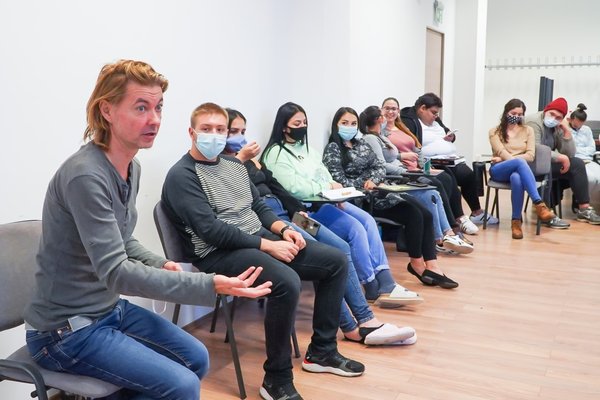
Zoltán Beck is known in Hungary as the frontman and lead vocalist of the popular rock band 30Y. It is lesser known that as a senior lecturer in the Department of Romology at the University of Pécs, he has had a decades-long acamedic career. He recently visited the István Wáli Reformed Roma Special College in Debrecen as a guest speaker, and was ready to engage in a conversation about Roma literature, nation-building aspirations and the connections between his parallel careers.
Where do you feel most at home: as Zoli Beck on the stage or as Dr. Zoltán Beck, a senior lecturer at the University?
I feel at home in both of them and each involves enough risk. Basically, my goal is not to feel homey in any of them. I think that every public speech matters. There is always something at stake. In case of a university lecture in front of the students we learn something about the world together, whereas regarding a concert the crucial question is whether we can create a world together.
Where does your interest in Romology and ’Roma issues’ come from?
Back when I was in high school, I’ve read a novel by József Holdosi, a Hungarian Romani writer. Later I met him personally which also made a deep imression on me. I also met Tamás Jónás in Szombathely – we were barely twenty years old at that time, young people full of dreams. Here, in Szombathely, we were able to offer a seminar on Roma literature, first in the country. More than ten of us met weekly and as students we read texts, mainly from hungarian Roma authors: Attila Balogh, Károly Bari, Menyhért Lakatos, József Choli Daróczi. I stayed on the topic, I wrote both my college and university thesis about Romani literature and it became the focus of my PHD research at the University of Pécs.
What makes Romani literature actually Roma? How would you discribe its particular characteristic?
In the everyday, 'laic' language we normally consider the works of authors with Gypsy/Roma background. Using these terms in a scientific context, our task is to interpret them according to their actual value of use and apply them as such when studying a given text. Consequently, Romani literature doesn’t only mean texts written by Roma authors. It also includes the representation of gypsies in literary texts in general. For example, what kind of roma figures and how they are represented in the novels of the famous Hungarian novelist, Mór Jókai (outside Hungary also known as Maurus Jokai or Moriz Jokai) or in the poetry of the 18th century, or how the roma letters appear in the novels of Imre Kertész, Péter Esterházy or Andrea Tompa. I'm lso committed, vertainly, to make sure that valid, relevant texts won't become 'invisible' just because they don't play a key role in the literary corpus. However, this is no longer a scientific task, rather some kind of a literary activism. This is why I consider it important to talk or write about Roma writers like Tamás Jónás, Lajos Rafi or József Bogdán.
"A society that has the tendency to seek scapegoats and draw energy from hatred creates a constant existential anxiety. I see it as a fundamental problem that in European societies, it is not dialogue and common sense that offer solutions to problems, but hatred on one side and autocratic will, expropriation and power on the other." - Zoltán Beck

Dr. Zoltán Beck is a senior lecturer at the Department of Romology and Sociology of Education and also the headmaster of the University of Music (ZEN) at the University of Pécs, Hungary. His work is especially concerned with the topic of ethnic aspects of literature, focusing on strategies and interpretations, contemporary Roma literature, fine arts and music. Since 2000 he has also been working as the singer, songwriter and guitarist of the band 30Y.
"Fortunately, in many cases, the Roma intelligentsia has a say in the discourse about the Roma and Gypsies, but this issue cannot be resolved by the comfortable transfer of responsibility. It would be a jovial, leaning gesture to say that Roma can now talk about themselves, for freedom is not about being able to talk about myself; freedom is when I can talk about anything that matters." - Zoltán Beck
Considering Roma authors, whose work impresses you the most from contemporary Roma literature?
If I think about who I would like to recommend to young people, with whom they can feel connected in the present, I would mention Tamás Jónás. He has a significant oeuvre now, with great volumes of poetry and prose. In addition to that, I could list a lot of names who, by the way - and I think it is important to emphasize this - are significant authors, not because of their Roma background, but because of their work. An impressive example is the “rebirth” of Attila Balogh, whose two excellent volumes have been published in recent years after a long hiatus.
Zoltán Beck: Overview about Hungarian Romani Literature
Read more about the representation of Roma people in Hungarian literature and about Roma novelists and poets
The full interview is only available in Hungarian. Highlighted statements of Zoltán Beck has been quoted from an interview he gave to the hungarian weekly magazine Magyar Narancs.